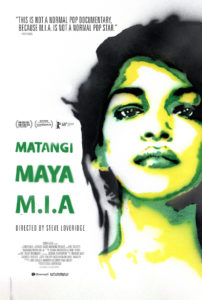Film Review: Bad Girls Rule in “Matangi/Maya/M.I.A.”
Written by: Christopher Llewellyn Reed | September 27th, 2018

Matangi/Maya/M.I.A. (Steve Loveridge, 2018) 4 out of 4 stars.
In a rousing documentary profile of Sri Lankan-born activist and hip-hop performer M.I.A., director Steve Loveridge (making his feature debut) – a friend of hers since their mutual time in a London art school in the 1990s – crafts a penetrating narrative that walks us through the important, formative beats of its subject’s life, from her start as a poor immigrant to her rise as a global phenomenon. A self-described “problematic pop star” – which means that, as a strong-willed woman of color, she refuses to shut up – M.I.A. provides much of the footage, herself, since she has long gathered visual materials to support her work recording the human-rights abuses in her native country (she also initially wanted to be a documentarian, before switching to music). By the end of this well-edited, masterful 90-minute portrait, she emerges as a complex, inventive, fully engaged artist who should, in fact, be listened to, even when she does more than just sing.
Early hits such as “Galang” and “Sunshowers” – both in 2004 – propelled her into the spotlight, announcing a brave new talent unafraid to use her ethnicity as both a musical and political tool. The daughter of the founder of Sri Lanka’s Tamilresistance movement, she has always been vocal in her defense of her people against the island nation’s official repression, calling out the summary execution of guerillas as a genocide. One person’s freedom fighter is another’s terrorist, however, and her intense focus on raising awareness – in both public statements and her work – of the wrongs she sees, has led some people to call her a terrorist, herself, or at least an apologist for terrorists. Either that, or, as she has accrued fame and fortune, others – like the New York Times’Lynn Hirschberg, who accused her of adopting an attitude of “radical chic“– have questioned her appropriation of the tropes of gangsta rap and violent imagery as a façade to mask the superficiality of her messages. To each their own, I suppose, but I warrant that if M.I.A. were a white man, she would get away with a lot more (as far as Western critics are concerned, in any case).


Fortunately, hers is such a dynamic personality, combined with a strong will, that what others think of her matters for little, at least as far as we can see. Just check out her videos for the 2010 “Born Free” (beware the graphic content within) or the 2012 “Bad Girls” to see how much effect the naysayers have had on her (though the controversy surrounding her on-screen middle-finger flip-off at the 2012 Super Bowl certainly took some kind of financial toll). Supported by family and friends, she hardly needs the approval of the American critics, anyway (though plenty still like her). Active as ever, still doing her thing and not yet 45, she has the world in front of her, and that’s enough. As the movie’s title indicates – referring first to her birth name, then adopted English name, then adopted stage name – she’s both a survivor and adapter, sure to triumph over detractors. We need more powerful women on this earth, and she leads by example.


